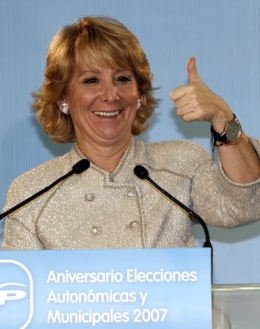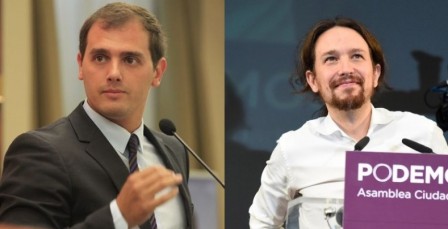Podemos… maybe.
Life is hard for a communist. Not only do you have to endure accusations and ghastly comparisons between your ideology and the murderous regimes of the 20th century, but you also have to put up with different brands of leftists. Some of them even revisionists and unorthodox (shock!).
The apparent slow disintegration of Podemos at the polls from its heyday of December-January, when it was polling at 27%, to its steep decline a mere three months later to 16,5% has to do more with classical leftist malaise than with physics (all that rises must eventually descend). The chronic problems of factional infighting, perceived radicalism, and proof of unexceptional moral standards (just like the rest of the casta) have brought this political party down from the clouds and maybe even down underground.
Of all these factors the crucial one has been the perceived realization by the Spanish electorate that, contrary to what the leading figures of Podemos state, they do not have the monopoly on morality and ethics and hence they do too commit actions of dubious moral nature. Which is somewhat unjust since Podemos is being frantically scrutinized by the media and expected to have moral standards akin to that of saints. Although the party does have some blame for this, having portrayed itself as a cleansing and morally righteous new force, the other political parties are not subjected to this level of examination and indeed many of them (especially the PP and the PSOE) have done not just morally wrong actions, but downright ilegal ones, with little outcry in some sectors.
The PP, the PSOE, and the media had started to lambast Podemos after they became prominent in the European Parliamentary elections of the 25th of May 2014 where they won 7% of the votes (previously they had just laughed at them calling them “freaks”) and attacked their most weak, and easy, spots: connections with Venezuela (Juan Carlos Monedero, ex-number 3, had direct ties with the Chávez government through several advisory positions that he had held), connections with Iran (the program that Pablo Igelsias hosts, Fort Apache, has a contract with an Iranian broadcaster, through HispanTV), and lastly of being pro-terrorist and pro-ETA (based on conferences given close to the Basque terrorist group). But unwittingly these political attacks through dubious means only demonstrated the acute fear that the establishment and all its vested interests had, to the point of appearing united against Podemos; thus underlying the partiality of the system regarding its interests and did nothing but increase the popularity of the insurgent political party that reached, as previously said, 27% of the national vote share in polls and gathered 150.000 people at La Puerta del Sol on January 31st.
But then the Monedero affair happened, and it marked a watershed moment for the party.
In a country where there is over 20% of unemployment, and salaries and standards of living have decreased, Podemos flourished through its rhetoric that it was something different: a real left-wing, offering real solutions in a country where the socialists were the same as the conservatives. But the revelation that Monedero had evaded paying the amount of taxes he should have paid as individual by processing his income (advising South American governments on the creation of a Bolivarian currency) through a shadow company showed a different reality.
Also the discovery that this amount was of 425.000 euros smacked of gauche caviar, akin to the PSOE, rather than the new revolutionary leftist group of its origins.
But if this wasn’t enough damage for the party, it also has to deal with the eternal return that all leftists have to deal with: infighting.
Podemos was born of the 15M movement, which in itself was a colorful and varied amalgam of ideologies and political visions. But one of the biggest forces, and where Teresa Rodriguez (the current Secretary General of the regional Andalusian Podemos) was a member of, is Izquierda Anticapitalista (Anti-Capitalist Left), which as the name indicates holds a hard-left ideological position. This group was integrated into Podemos formally at the beginning of this year, changing its name to Anti-Capitalists, and its sway in the party has become considerable especially since the decrease of the party in the polls. This is because Podemos has attempted to encompass the left of the political spectrum as well as the center and was doing it quite admirably until Ciudadanos appeared and ate into the share of Podemos’ votes at a radical pace (no pun intended).
Now that the more moderate factions within Podemos have been discredited, the hard left is vying for more power within the party and to perform a strong steer towards radicalism, leaving behind all moderation and attempts at centrality. And given the surge of Ciudadanos, it might as well do so since all the dissatisfied voters who were going to vote for Podemos because it was the only true alternative to the old political parties are going to naturally veer towards Ciudadanos, as they are perceived as less radical.
This conundrum at the center of Podemos is one of the reasons why Monedero decided to leave his position within the party on the 30th of April, accusing the party of having become what it was fighting against and of forgetting the spirit of the 15M. This will undoubtedly hurt the party, as it underlines the factional infighting that it is suffering and will force its leading figures to choose a clear path: either centrality and risk being overrun by Ciudadanos, or radicalism and risk being perceived as risky.











